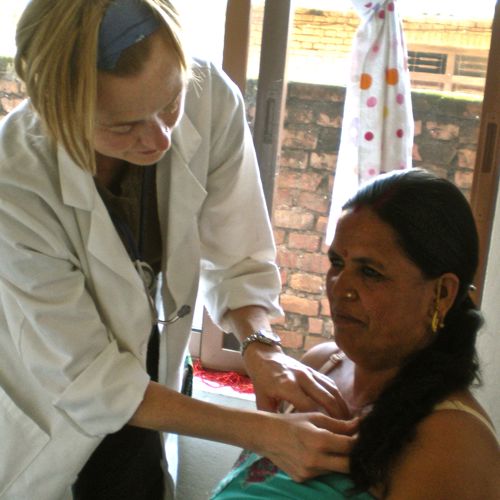
I am literally bumping down the road from the Himalayas as I write this. My guide, Ganesh, is amused because it is quite the task considering the road. However, the long bus ride affords me the opportunity to reflect upon my experiences at the Vajra Varahi Clinic. I remember one year ago while still in classes, I would look at the Acupuncture Relief Project blog with longing. Now, I feel so blessed that I was present at the one-year anniversary of the clinic as it completes one cycle and begins another.
Most of my time was spent in Chapagaon, so I feel that my adventure in Nepal holds more depth than width. I am already feeling the loss of the clinic and its uniqueness both in living and working. Living together as a community was never dull. We had the four practitioners and Nicky the clinic director, as well as constant additions and subtractions. The food was amazing thanks to Umilla our cook. I am now an amateur chapatti maker and even bought my own pan to recreate the experience when I get home. The daily rhythm cannot be replaced and I long for the 5:30 am gong calling the monks to puja, the morning yoga on the roof, the after clinic walks through the village, and the evening monk clinic followed by conversations. These conversations were invaluable because the constant examination of our medicine and the case study discussions helped us find ourselves as practioners.
I will not be able to recreate the atmosphere that is succinctly Vajra Varahi Clinic anywhere else. I will miss the bracelets that get in the way of any wrist point and ear points that have to be managed around large jewelry. Both men and women wear miles and miles of fabric so that if you want to go anywhere near the middle be prepared to wait five minutes for an unwinding. I will miss the expressiveness of my patient’s faces as they explain their story, the richness of one interpreter’s voice and the sweetness of another. I appreciate that I could occasionally lean into Heidi amidst the chaos. By chaos I mean the combined effect of people piled in the waiting and treatment rooms who talk to one another while we try to communicate with them through an interpreter, all under the gaze of people staring in through the windows. Once a cow mooed so loudly outside the window it could have been standing next to me. Practicing in the U.S. will seem so quiet in comparison.
It is perfect that we are here for the harvest season. When we arrived the rice fields were lush and full. Now the plants are cut to the ground, the grass and seeds are drying and being packaged for the rest of the year. I feel that it mirrors my relationship with the medicine. Four years ago I planted my seeds when I started at the Oregon College of Oriental Medicine (OCOM). I had to nurture my dreams fiercely through the challenges of school. As I am here I have been cutting down the fruits of my labor, some I will use now, some I will chew on for awhile and some will be replanted.
Thank you to everyone who made this experience possible for the team, the clinic, our community and me. – Jennie











